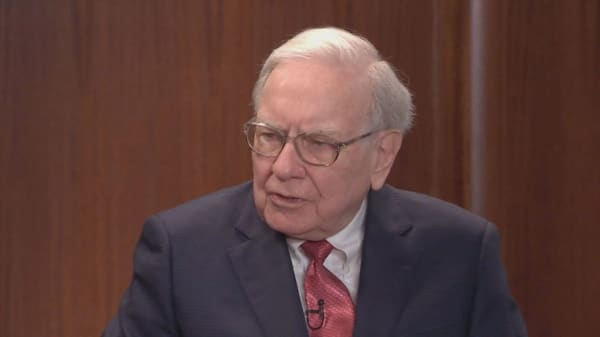Nearly 10 years ago Berkshire Hathaway CEO (and arguably one of the best investors on Earth), Warren Buffett, issued a challenge to the hedge fund industry — a $1 million bet that they could not put together a portfolio of hedge funds that would outperform an S&P 500 Index fund over a 10-year period.
Buffett was convinced the combination of active stock-picking and high costs would result in lagging market performance, and he was willing to put his money where his mouth was.
One company stepped up to the challenge. Protégé Partners LLC selected five hedge funds (the names of the funds have not been disclosed publicly), and Buffett selected the Vanguard Admiral Shares S&P 500 Index Fund.
Hedge funds vs. index fund
The 10-year period began January 1, 2008, which means we are in the final year of the challenge. While we don't know the funds selected by Protégé, we do have a nine-year performance update — and it's not pretty.
The hedge fund portfolio is up just 22 percent over nine years. That's slightly better than 2.2 percent per year. How did the S&P Index fund do? Oh, just a smidgen better. It's up 85.4 percent, or 7.1 percent per year on average. The results by fund are even more startling:
2008–2016 Cumulative Returns of Funds in the Buffett Challenge
⋅ Fund A: 8.7%
⋅ Fund B: 28.3%
⋅ Fund C: 62.8%
⋅ Fund D: 2.9%
⋅ Fund E: 7.5%
Hedge Fund Average: 22.0%
Index Fund: 85.4%
These are cumulative returns for the nine years, not yearly averages, and all I can say is "yuck." Not only is the hedge fund portfolio lagging the index fund by a wide margin, not a single fund that Protégé selected is outperforming the index fund. Only one even comes close, and it's still trailing by more than 25 percent. Three of the five funds have average annualized returns of less than 1 percent!
More from FA Playbook:
How to figure out if you'll be able to retire early
Why a 30-year mortgage may not be your best option
Investors clueless about impact of a possible market correction
The challenge period officially ends Dec. 31, 2017, and it would take something we couldn't really call a miracle for Protégé to win. It would take a catastrophe, a market meltdown that would dwarf the Great Recession of 2008–2009, an event that would be so detrimental to investors and fund managers that Protégé themselves must secretly be hoping they will lose. And even with such a disaster scenario, Protégé might still lose if the funds they selected didn't hedge away most or all of the market downturns.
How the Buffet bet is structured
My favorite part of this story is about the bet itself, which should provide only further embarrassment to Protégé and the entire active-fund industry. Not content to make it a simple bet — just put up a half million dollars each and make it a winner-takes-all bet — the two parties agreed to put up a smaller amount and invest the money in zero-coupon Treasury bonds with the intent of growing the investment to $1 million by the end of year 10. That amount was calculated to be $640,000, so Buffett and Protégé each put $320,000 into the account nine years ago.
It didn't take until the end of 2017 for the account to grow to $1 million. Interest rates plunged in 2008 and 2009, sending the value of the bonds way up, and the account reached $1 million in 2012! Currently, there's more than $1.8 million in the account, or about triple what was invested. That's much better performance than either Protégé's fund portfolio or the index fund.
Lest you think the bet was about money, whatever amount is in the account at the end of the year will be given to the charity of the winning party's choosing: Girls Incorporated of Omaha if Buffett wins, or Friends of Absolute Return for Kids if Protégé wins.
Interestingly, Protégé did what they do best before the bet period even began — they hedged! They wrote back in 2007, "Hedge funds don't set out to beat the market. Rather, they seek to generate positive returns over time regardless of the market environment." A curious comment from a company accepting Buffet's challenge to pick a group of funds that will, well, beat the market.
(Editor's Note: This column originally appeared at Investopedia.com.)
— By Steve Tepper, chief operations officer at Northstar Financial Planners










